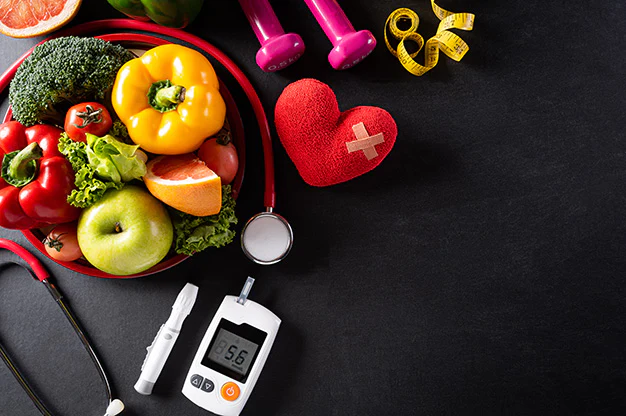Healthy Tips for Diabetes

34 million people in America have Diabetes and 1 in 4 people do not know they have it. This disease is the 7th leading cause of death and the number of diagnoses have almost tripled in the last 10 years. During Diabetes Awareness month, we here at Noo-tropics want to share the best supplements to prevent diabetes and manage blood sugar, as well as some other lifestyle choices that will keep the heart and blood healthy.
What is Diabetes
Doctors diagnose diabetes when the body’s cells can no longer “open their doors” to absorb sugar (glucose). The “key” to opening the door of the cells is Insulin, a hormone produced by the pancreas. When the pancreas stops secreting insulin, doesn’t secrete enough, or our cells stop responding to insulin, our blood glucose levels rise. A constant stream of elevated blood sugar levels can cause damage to the heart, kidneys, eyes, and nerves.
There are 3 different types of Diabetes.
Diabetes Type 1 is an autoimmune disease. This is when the pancreatic cells attack themselves and the body can no longer produce insulin. This type of Diabetes requires close monitoring of blood sugar levels and daily insulin injections for management. Up to 10% of people with diabetes develop Type 1, also known as Juvenile Diabetes, which can occur at any age.
Type 2 Diabetes Mellitus is the most common type, occurring in mostly middle-aged and older adults. In type 2, your body is either not making enough insulin or the body’s cells isn’t responding to Insulin. Selective food intake, supplements, weight management, and exercise can effectively control this type of diabetes.
Gestational diabetes, also known as Type 3 diabetes, occurs exclusively in pregnant women. Although it goes away after pregnancy, these women are at a higher risk of developing type 2 later on in life.
Causes and Symptoms of Diabetes
There are many risk factors that can contribute to the diagnosis of Diabetes. These include:
- Genetics (a family history of diagnosis)
- Obesity
- Having High Blood Pressure
- A lack of Exercise
- A poor Diet; specifically, a high sugar and fat diet
- Being a Smoker
The most common symptoms of Diabetes include frequent urination, blurred vision, increased thirst, fatigue, and numbness or tingling in the hands and feet.
Supplements for Diabetes
Many may wonder, what vitamins can a diabetic take? Some vitamins aren’t safe for diabetics, so it’s important to avoid them for diabetic health. These include chewable tablets, sweetened liquid formulas and lozenges. These all contain added sugar and would not yield beneficial. However, multivitamins are good for diabetics, as they help get nutrients that may be missing from the diet, which helps the body function more optimally. Below are some of the best supplements for preventing diabetes and lowering blood sugar levels if you’ve been diagnosed.
Chromium
Chromium is an essential trace mineral which means our bodies do not need a lot of it for proper function. Adult women only need 25 mcg, while adult men only need 35 mcg a day. It enhances carbohydrate, protein, and lipid metabolism. Taking Chromium helps to improve glucose tolerance and stabilize blood sugar levels by improving the way the body uses insulin. You can find this mineral in whole grains, broccoli, brewer’s yeast, green beans, beef, and poultry. Talk to your doctor about possible deficiency and the right dosage for you.
Cinnamon Extract
This common kitchen spice is not only for baking and flavor, it contains amazing health benefits as well. Whether in stick or powder form, cinnamon is a powerful antioxidant, protecting the body from free radical damage while strengthening the immune system. It works by helping the cells respond to insulin more effectively, which allows sugar to enter the bloodstream and in turn lower blood sugar levels. Cinnamon is a top diabetes supplement, easily incorporated into recipes and offering great taste. Supplementation often comes in concentrated extract form, safely supporting blood sugar for individuals with Type 2 Diabetes Mellitus.
Aloe Vera Leaf
This bitter tasting prickly plant has been used for thousands of years in herbal medicine. Inside of the plants leaf is a clear gel-like fluid that has been used for everything from digestive ailments to dental health. Studies suggest that the pulp can help to lower blood sugar in non-insulin dependent diabetics. The concentrated juice is available in stores, or you can blend the inner pulp with water and drink daily for prevention.
Glycemic Index
The glycemic index is a number from 0-100 assigned to each food with pure sugar being “100”. Foods are ranked by how fast they convert to glucose, affecting blood sugar levels accordingly. Foods with a rating of 55 or below cause a gradual increase in blood sugar, which is beneficial for diabetics. The foods rated 56-100 release glucose faster as the number increases; they should be consumed cautiously or avoided. Taking note of common food ratings on the glycemic index can help when preparing meals or incorporating new recipes into the diet.
How to Prevent Diabetes
Diabetes prevention boils down to the way we eat, how active we are and the vitamins we take. Try to avoid fatty and high sugar foods as it burdens the pancreas and the heart. Exercising helps to burn off that extra energy (glucose) and get it out of the bloodstream. Being conscious of these things makes Diabetes more manageable.
All in all, Diabetes is a growing problem in America and prevention is key. Maintain healthy weight with the glycemic index and exercise, keep heart healthy with supplements and daily movement, and stay updated through ADA. Follow the glycemic index, take diabetes supplements, and seek support for a healthy, balanced life to pursue longevity effectively.
Also read our blog on Intelligence Not Equal to Income